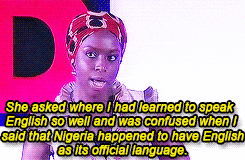Recently I came across a TED talk that was particularly relevant today although the talk aired in 2009.
The TED talk was called “The Danger of a Single Story” spoken by the well-known Nigerian writer Chimamanda Ngozi Adichie.
The main message in her talk was to address the issues regarding the misconceptions of African countries.
According to many media platforms, African countries like Nigeria are often portrayed as helpless and poverty stricken. In contrary, many African countries especially Nigeria are progressing socially, politically and economically.
In her talk, she mentions her experiences in childhood, attending a university, and her arrival to the United States.
Chimamanda Adichie explains in her speech, “She assumed I did not know how to use a stove. What struck me was this: She had felt sorry for me even before she saw me. Her default position toward me, as an African, was a ind of patronizing, well-meaning pity. My roommate had single story of Africa: a single story of catastrophe. In this single story, there was no possibility of Africans being similar to her in any way, no possibility of feelings more complex than pity, no possibility of a connection as human equals”
Its important to not pertain certain cultures to a “single story” as Adichie says. A singlestory represents a single narrow perspective on an individual’s way of life. Its hard to gain an actual perspective on certain countries, when we are not being educated enough about these countries. Too often, we find ourselves easily persuaded by the media that is presented to us, when most of the media can be misleading or offers false exaggerated information.
“So, after I had spent some years in the U.S as an African, I began to understand my roommate’s response to me. If I had not grown up in Nigeria, and if all i knew about Africa were from popular images, I too would think that Africa was a place of beautiful landscapes, beautiful animals, and incomprehensible people, fighting senseless wars, dying of poverty and AIDS, unable to speak for themselves and waiting to be saved by a kind, white foreigner. I would see Africans in the same way that I, as a child, had seen Fide’s family”
It is ultimately up to us as Americans, as individuals with the capacity of learning and understanding, to broaden our perspectives on the lifestyles people choose to live. These “single stories” can be offending to most, but are often not done intentionally. As Adichie says above, her roommate failed to recognize that although Adichie comes from Nigeria, that does not entail that she had lived a sad poverty stricken childhood. Her roommate did not mean to offend her, it was just a result of her lack of understanding and exposure that lead her to believe that Adichie did not know how to use a stove.
In conclusion, Adichie attempts to teach the world about understanding. Understanding that not all African countries are deemed as helpless.
This TED talk was created in 2009, yet the content shown is still relevant today. Today, there are still misconceptions about progressing countries and their citizens. Not only is there a lack of understanding regarding their progress, but in general our societies are still making the mistake of over generalizing groups of people and cultures.
As humans, we find that putting people into categories saves us the time and energy of learning specifics about the individual. However, if we stop developing these categories and allow further freedom of individuality, only then we can renounce these single stories that define cultures and people; paving way for a more understanding society that accepts the various backgrounds of anyone around the world.
-30-






















